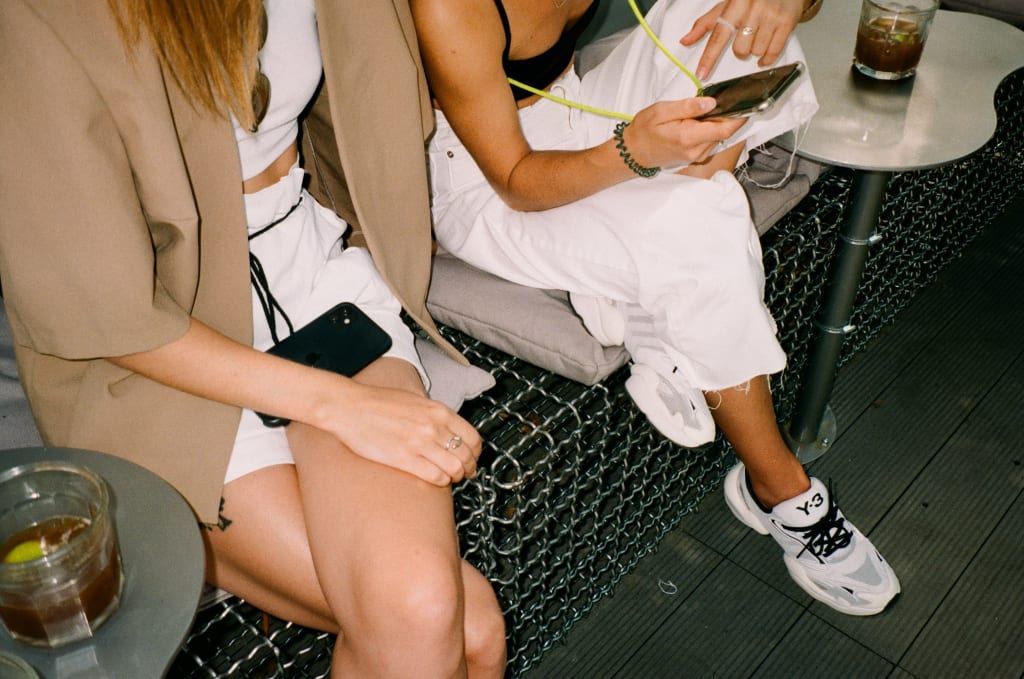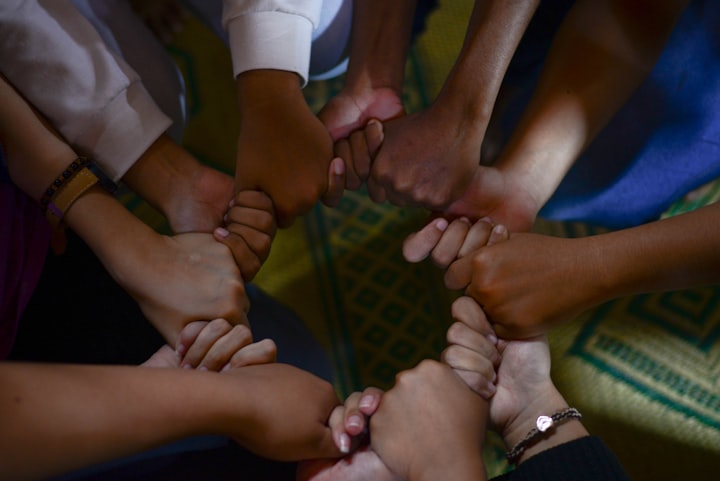4 Considerations When Hanging Out with People Who Don’t Drink
Suggestions from a twenty-something sober person

With the holidays approaching, most people are bound to encounter colleagues, friends, and relatives who, for one reason or another no longer drink alcohol, in the coming month.
Not only can booze-centric events such as holiday parties and dinners be especially challenging for those who don’t drink, but they can also lead to some edgy situations.
Based on my own experiences with uncomfortable conversations and awkward silences in relation to my sobriety, I’ve put together this quick list of 4 ways you can change the way you talk to and behave around people who don’t drink — both during the holiday season and year-round.
1. Ask permission before you pry
A couple of months ago, I was at a party when someone cautiously approached me.
“Maybe you don’t want to talk about it which is totally okay, but I was wondering why you quit drinking?” She asked, and then quickly blurted out, “Sorry is that super rude to ask?”
I could tell she was genuinely curious; perhaps she had considered her own relationship to alcohol in the past and wanted to understand what led to my decision. Regardless, she was clearly not just inappropriately prying.
“No, it’s fine — thank you for checking, but I don’t mind talking about it,” I said — prompting a brief, five-minute discussion about the years and months leading up to my quitting.
As with most major life decisions, opting not to drink anymore can be deeply personal. There are a lot of possible reasons why a non-drinker may not want to discuss why they aren’t drinking and they deserve the choice to decline the great “why don’t you drink” inquisition.
Perhaps they:
- Made a series of choices that led to outcomes that are still raw and hard to talk about.
- Are newly sober and haven’t decided how they want to position it.
- Have drinking-related traumas they are working through and don’t want to discuss.
- Just feel like it’s their own damn business.
No matter the reason, it’s always safest to ask if they’re comfortable discussing their sobriety before diving in with questions. It’s not inherently wrong to be curious, but it is wrong to pressure someone into a conversation they do not want to have.
2. Stop paying such close attention to what they are drinking
I cannot tell you the number of times I have been out with friends drinking a non-alcoholic beer or canned flavored water and been met with “oh my god are you drinking?!”
For many people, choosing not to drink is not done on a whim. It is not the kind of flimsy commitment that you make and then throw your hands up and say “well, let’s see how long this lasts!”
Sure, there are spouts of sobriety that ordinary people engage in, such as Dry January or Sober October, but those are not the people I am talking about in this context.
When someone draws attention to what the non-drinker has in their hand, they accomplish two very uncomfortable things:
Put the non-drinker on the spot and force them to announce to everyone around that it is a non-alcoholic drink (perhaps they are opting for a non-alcoholic option to fit in and not have to address the fact that they aren’t drinking alcohol).
Assume the non-drinker is either not serious about their commitment to abstaining or that they have begun drinking again despite their commitment not to (both are hurtful and invasive).
Neither of these effects is kind and both will surely make the non-drinker self-conscious and no longer at ease in their environment.
3. If you’re going to address their decision not to drink, try complimenting them
So often when someone does feel the need to comment on the fact that I am not drinking it comes in the form of:
“Wow, I could never do that.”
“But how do you have fun?”
“Wait so you never want to drink again, ever? But you’re so young!”
None of these statements — or any others resembling them — make the non-drinker feel good. These comments hurt and they reinforce the ingrained idea that people who don’t drink don’t fit in and are not wanted in drinking environments.
Instead, if you do feel inclined to address the fact that someone in the room isn’t drinking, I would suggest complimenting them.
Becoming and staying sober is fucking hard. And being in an environment with you, dearest drinker, is also fucking hard.
Not because non-drinkers don’t like being around drinkers or don’t enjoy themselves when in drinking environments, but because there is an inherent in- and out-group mentality when it comes to drinking.
No matter how secure in my sobriety I am, I still always feel anxious when the tray of shots comes around and that one, too-drunk person insists repeatedly that I take one because “it’s on him.” (The $4 charge is not the issue at hand, Kevin.)
So, here are some compliment suggestions that I personally would welcome:
- “You are so much fun to hang out with!”
- “I think it’s incredible that you have made this commitment to yourself.”
- “Quitting drinking is brave — you are brave.”
- “I’m so glad you joined us out! I’d love to do something not drinking-related sometime too.”
4. Invite them always, but be clear about the type of event it’s going to be
I live 5 minutes from my mom and stepdad and about 7 minutes from my younger brother. I spend a lot of time with them, whether it’s for family dinner, brunch and farmer’s markets on the weekends, or just popping by for coffee and catching up.
Early on in my sobriety, I had a difficult time attending family dinners when I knew they would all be drinking. Sure, it was often a casual, weeknight gathering, so the drinking in question was a glass or two of wine, but it still felt too difficult for me to take on in those early months.
As time passed and we all adjusted how we talked about my sobriety, I felt comfortable letting them know that while I didn’t want to be automatically excluded from any get-togethers, I did want the option to bow out if it was going to be drinking-heavy.
These days, when my mom calls to see if I want to meet them for happy hour, for example, the invitation often includes one of two clarifying details, either:
We’re just gonna grab a bite and have a drink so we can all catch up; or,
It’s been a hell of a week, I’ll probably have a couple of drinks just so you know.
Based on my experience, this is a great rule of thumb. No one wants to feel like they are unwanted — whether that’s with family, friends, or coworkers.
This system allows you to be totally inclusive while also being transparent about your expectations for the evening.
Did you buy a keg for the party or a case of beer?
Does the guest list have a large number of your best drinking friends on it?
Are you going to the window-less, dive bar where you always blackout?
These are good details to share with your non-drinking friend when you invite them along. Maybe they’re up for it; perhaps they think drunk people are a riot. You won’t know unless you ask.
This works in reverse, too. Last year, my husband and I made plans with two friends for New Year’s Eve. We were still in the throes of Covid, so we made plans to go to a small gathering of people who were taking all of the precautions. The event was in South Florida, so we planned to stay the night at my friend’s apartment.
Despite being a guest, I knew I needed to be clear about my expectations and limitations. A couple of weeks beforehand I created a group text with our two friends and my husband and texted the following:
“I’m really looking forward to seeing you both in a couple of weeks! It’s been so long since we were able to be social! I do want to warn you, though, my sobriety is still fairly new and I am feeling quite nervous about being around drinking people during what is always a drinking-heavy holiday. I’m certainly not asking either of you to drink less than you’d like to or behave any differently for me, but if you feel like you’d like to drink to get drunk then please let me know because I may decide not to participate after all.”
They were both incredibly grateful for the heads up and let me know that they didn’t intend on drinking heavily. I was grateful for their honesty and acceptance. It was a win-win.
In the end, as long as you lead with kindness and empathy you’re already being a considerate sober ally. However, it is easy to unintentionally alienate or hurt feelings when you aren’t aware of the nuances of that person’s lived experience. As we head into the holidays, I urge you to consider how difficult such drinking-centric festivities might be for the non-drinkers in your life. With just a little extra thoughtfulness, you could make all the difference in someone’s experience.
About the Creator
Taylor Moran Writes
I write about sobriety & mental health. Subscribe to my weekly newsletter here: https://www.gratefullysober.com/






Comments
There are no comments for this story
Be the first to respond and start the conversation.